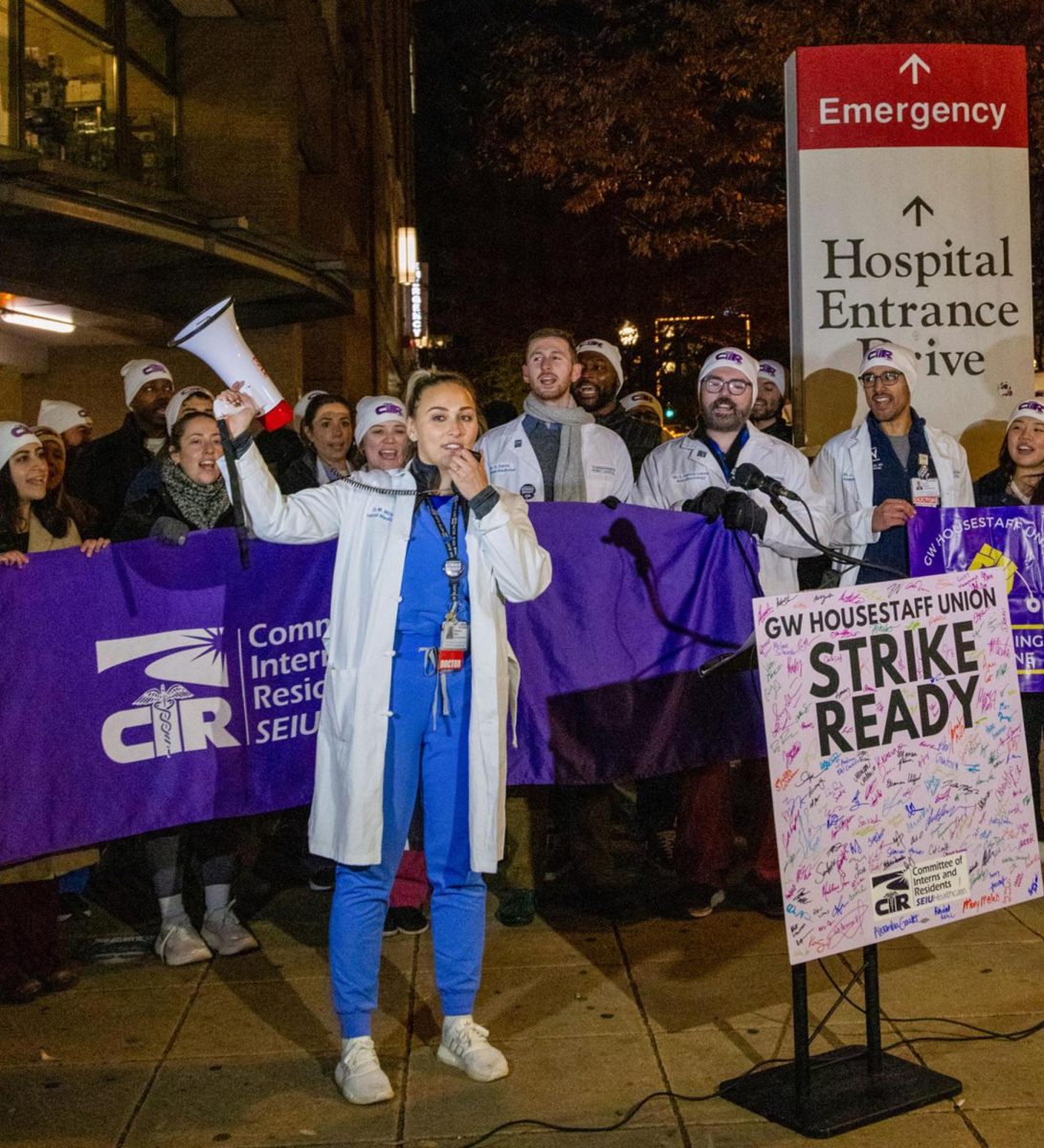School of Medicine & Health Sciences residents and fellows on Tuesday announced that they plan to strike starting Dec. 17 if the University fails to reach a contract with the union for higher wages and mental health care at a Thursday bargaining session.
The union said in a press release Tuesday that 98 percent of union members voted from Nov. 21 to 26 to authorize a strike starting Dec. 17 at 6 a.m., should they fail to reach a fair contract with the University at a bargaining session set for Thursday. The press release cites low wages, “rampant burnout” from routinely working more than 80 hours a week and insufficient mental health care resources as reasons for voting to initiate a strike more than a year after the union entered contract negotiations with the University.
The vote to authorize a strike comes after the union attempted in recent months to pressure the University to accelerate the collective bargaining process by forming a picket line and starting a petition that garnered more than 300 signatures. The union said late last month that residents and fellows voted to initiate a strike because they have “exhausted all options” to reach a contract with the University. The union said officials have rejected “key” proposals, canceled bargaining sessions on multiple occasions and used “delay tactics” and “unfair labor practices” since they initiated contract negotiations in November 2023.
The union is required to notify GW 10 days in advance of striking because they represent health care workers, according to the National Labor Relations Act.
University spokesperson Shannon McClendon said GW officials are aware of the residents’ plan to strike and are continuing to negotiate with the union. She said since October 2023, the union has made “significant progress” in negotiating the contract, with 24 contract provisions completed.
“The university understands and acknowledges the importance of the remaining unresolved issues, including benefits, compensation, and access to mental health services,” McClendon said in an email. “The good faith negotiations that have been underway and will go forward include a range of new enhancements that are responsive to union concerns.”
McClendon said the University offers residents a “robust suite” of benefits. The 2024 Benefits Guide for residents released by GW stated fellows and residents have access to UnitedHealthcare with services like SimpleTherapy, an organization connecting patients to mental health professionals, and Castlight, a digital platform helping people navigate the health care system. She also said SMHS created the GW Resilience & Well Being Center to support GW employees, including fellows.
“The university has been and will continue to be sensitive to the mental health and wellbeing of health care professionals and it provides residents with a robust suite of related benefits,” McClendon said in an email.
Drew Davis, first-year resident physician in internal medicine and a member of the bargaining team, said the union plans to give GW advance notice before beginning their strike, should GW not grant them a “fair” contract. He said the union is giving GW notice because they need to put in temporary workers to care for patients while they are striking.
“We do this job because we care about patients, so that’s why we’re giving GW time,” Davis said.
He said his starting salary as a resident is around $65,000, which makes it difficult to save for the future and find an apartment, where the average cost for rent is $2,279 per month. He also said many residents, including himself, took more than $100,000 of debt to attend medical school. Davis said with his low wage he cannot consider getting married or starting a family because of the high cost of living in the District.
The cost of living in D.C. is 39 percent higher than the national average, according to Payscale.
“Treat us like that and not bargaining in good faith is obviously very frustrating,” Davis said.
Elsa Alaswad, a resident physician in neurology and member of the bargaining team, said during the press conference that physicians and fellows at GW Hospital work “long hours” on little sleep, which takes an “enormous toll” on residents’ and fellows’ physical and mental well-being.
She said there have been at least seven medical students in the D.C. area who have lost their lives to suicide, including a surgery resident at GW. William West, an ophthalmology surgery resident at GW Hospital, died by suicide on March 1. SMHS residents and fellows sent a letter to GW later that month calling on the University to prioritize the well-being of residents.
“How many more do we have to lose before GW realizes this is a humanitarian crisis?” Alaswad said. “They know the residents are struggling.”
Neha Gupta, a resident physician in emergency medicine and member of the bargaining team, asked at the press conference that GW leadership, including University President Ellen Granberg, not to turn their backs on physicians and the community they serve by returning to the bargaining table and giving them a fair contract with higher pay and mental health resources.
Gupta said as a doctor in residency she faced burnout and had to forgo mental health treatment because of the “inadequate” health care benefits physicians and fellows receive.
“GW has left us no choice at this point unless they step up and negotiate in good faith,” Gupta said.
Gupta also said physicians and interns at GW hospital make as little as $15 per hour, with many “struggling” to afford rent, buy groceries and take care of their families. The SMHS Salaries and Benefits page states that for the 2024-25 school year, GW residents make between $66,628.08 and $86,902.56 before taxes.
She said the union is also requesting GW provide better mental health resources for physicians and fellows who have to make “life and death” decisions for patients’ well-being everyday.
“We’re not asking for anything unreasonable,” Gupta said.





